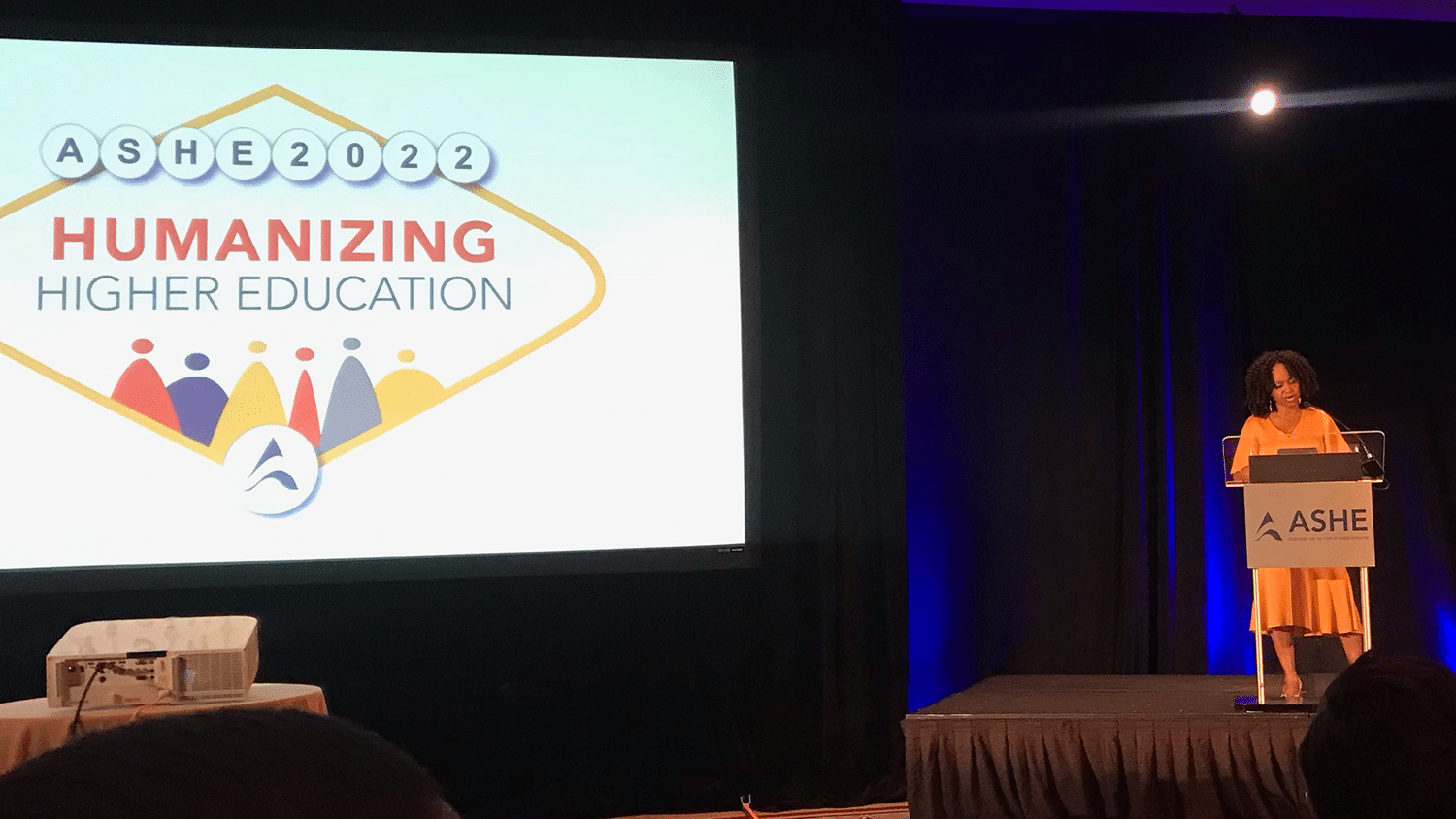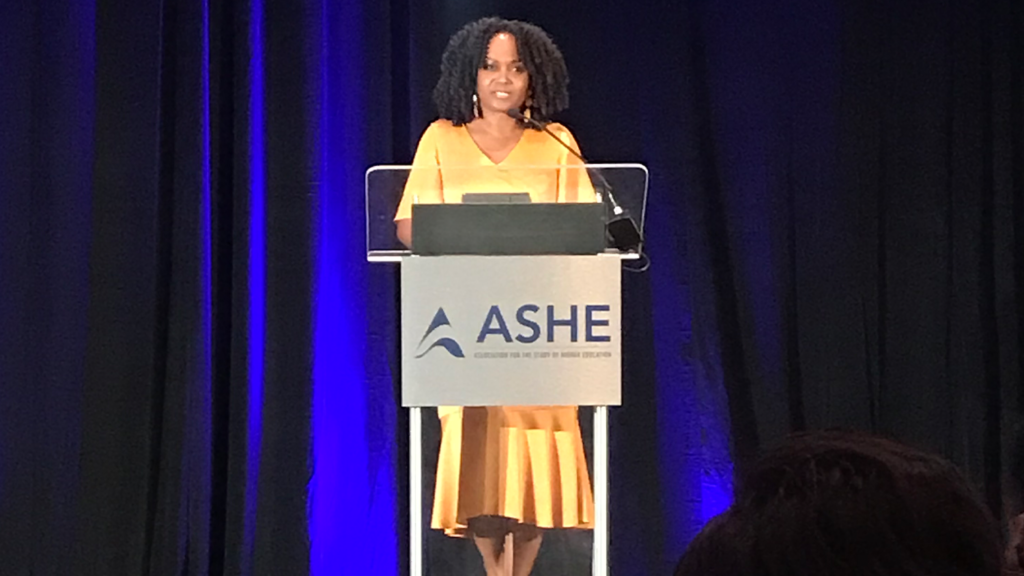Q&A with Joy Gaston Gayles, ASHE President

As Joy Gaston Gayles, a professor of higher education and senior advisor for advancing diversity, equity, and inclusion in the NC State College of Education, took to the stage to give her first remarks as president of the Association for the Study of Higher Education (ASHE), she wanted her colleagues to understand that she sees their humanity as scholars and wants to honor and recognize it, so they can use their research and scholarship to bring change to the world.
Her sentiments echoed the 2022 presidential theme, “Humanizing Higher Education,” which, Gayles said, means that perhaps scholars must shift their focus from a question of “What’s wrong with people?” to the question of “What matters to people?”
“Many of us study complex problems, and we often start by focusing on the problem — what’s wrong with our educational system, or worse, what’s wrong with the people within our educational systems,” she said in her remarks. “What if we shifted our focus in solving complex problems by focusing on what matters to the people we study within our educational systems, particularly those who find themselves on the margins of society and education?”
Gayles urged scholars to think about what matters to people as the world begins to rebound from the trauma of the COVID-19 pandemic, coupled with ongoing racism and social and political divides.
“As a scholarly community, we have an opportunity to learn from the atrocities that have occurred, and are still occurring, and imagine and innovate together for the greater good. In fact, many are depending on higher education to lead the way,” she said.
Below, Gayles talks about her goals as the newest ASHE president, what changes she hopes to see during her tenure and how the role ties in with her ongoing work in the College of Education.
The following Q&A has been edited for clarity.
How did it feel to be elected president of ASHE?
I became a member of ASHE in 2000 or 2001. ASHE has been my professional home for the last 20 years. If you told me back then that I would be elected ASHE president in 20 years, I wouldn’t have believed you at all! I share all that to say that I am both honored to serve as ASHE president and also pleasantly surprised that I was nominated and elected to serve.
I’m also excited about the opportunity to give back to a professional organization that has given so much to me professionally and personally over the years. The opportunity to engage with scholars across the world excites me. Together, we will have a chance to do some good through our collective research and scholarship to inform policy and practice as we continue to study pressing issues in postsecondary education.
What are you most looking forward to focusing on in this role?
The presidential theme for 2022 is “Humanizing Higher Education.” I’m most looking forward to understanding how our members define and enact this ideal through their research, within policies and in practice, as well as new ways we can think about doing so.
We have experienced so much over the past two years with the global health pandemic, coupled with heightened racial and social injustice. But, some of us have been experiencing discrimination and dehumanization our whole lives. It’s time for a change, and I hope this theme can help us think through opportunities and ways of being and knowing that humanize, value, respect and honor all people, not just some.
What goals or objectives are you aiming to accomplish during your term as ASHE president?
A couple of years ago, we went through a strategic planning process under Past President Kris Renn at Michigan State University. For the last couple of years, we have been making progress toward and acting on what came out of that process. It’s time for us to do that again. Part of my presidential term will involve helping to envision goals for the next phase of strategic planning. I’m excited about doing that kind of visioning with our members to help us figure out who we are and who we want to be as a professional association.
The only thing that’s constant is change. I’m excited about participating in the process alongside our membership to help us grow and mature and change in positive ways as a professional association.
What do you hope might change in higher education as a result of your work?
I’ve been a faculty member and scholar for almost 20 years. I have seen and experienced a lot, all of which informs how I see and approach my work within the academy. As a Black woman in the academy, I have experienced a lot of racism, sexism, micro-aggressions and other forms of discrimination. What I’m most interested in is disrupting policies and practices that disenfranchise people, particularly policies and practices that are “legal” and allow people with privilege and power to dehumanize vulnerable populations, who have little to no protection under the law. By doing so, my hope is that the next generation of scholars who hold margianlized identities will not experience dehumanization and discrimination in the academy the same way that I and so many faculty of color before me have. This kind of work often requires sacrifice.
I chose to become a full professor, to serve as president of a professional association and all of the other leadership roles that I have within the college and nationally by design. I certainly don’t take on these roles for self-serving reasons. I could just put my head down, not really engage or do a bunch of stuff that makes it look like I’m interested in equity in theory, but not in real practice. I’m not wired that way. So I try to do real transformative work that has a funny way of making people mad and, as a result, I’ve received a lot of flack and harassment because I choose to get into good trouble.
It’s not uncommon. We’ve seen civil rights leaders in the past who got into far more good trouble than I and have lost their lives fighting for equality. People shouldn’t lose their livelihood or feel scared, or get threatened or harassed for doing work that tries to make institutions more equitable and inclusive. I want to change spaces and places not just in education but in society, so that no longer happens. I realize that I may not see these ideals come to fruition in my lifetime. That, however, doesn’t mean that I will not keep chipping away at the problem and finding solutions that are rooted in what matters to people collectively.

How will you integrate your ASHE work, your research and your role as the college’s senior advisor for advancing diversity, equity and inclusion?
It’s all connected. My research and scholarship has always been about issues of diversity, equity and inclusion regardless of the content area. The work that I’ve done and am doing certainly will inform my role as ASHE president. But it’s not just my work. I rely on the scholarship of so many others in the field to sharpen my thinking.
In many ways, serving as a senior advisor for advancing diversity, equity and inclusion for our college has prepared me for the work that I will do as ASHE president. Chairing the task force for the past year or so has sensitized me to the nature of this work. It’s not fast work. It takes time to really think together about how we define what it means to be an anti-racist college of education and how we want to enact that in policy and practice.
Working with amazing people in our college is gratifying. I’m proud of what we’ve done so far, but we have so much more work to do to make positive change within our college. I’ll take those same skills with me to lead ASHE and continue the good work that has already been done by past presidents.
Is there any work from your role on the Diversity, Equity and Inclusion (DEI) Task Force that you are particularly proud of thus far?
YES! We meet once a month and the updates from the working groups are inspiring. The working groups — comprised of faculty, students and staff– are really thinking together based on their assigned domain. I’m excited to see what will result from this collective work relative to our deliverables.
I’m also proud of the “Courageous Conversations in Community” series. Our last one for the semester is coming up Nov. 16. We’ve had really amazing conversations with scholars and practitioners on topics that truly resonate with our College of Education community. Participation has been great and it’s nice to have a space where we can be in community together to talk about hard topics. For me, that is the true spirit of an intellectual exchange of ideas, including that which allows for varying points of view and perspectives.
Lastly, the DEI landing page has been a tremendous resource. I’ve heard from others around the country who have used it as a model for creating their own DEI resource hubs for their campus communities.
Are there any research projects you’re currently working on that you would like to share?
I’ve been working on National Science Foundation grants lately. We just submitted an ADVANCE grant with amazing scholar-leaders in textiles, public policy and the Poole College of Management.
Over the summer, I worked with an amazingly talented team to submit a proposal for the new NSF-EHR solicitation. That was the most fun and energizing experience I’ve had writing a grant proposal; to imagine possibilities for transformative change in STEM fields. I’m also working on finishing up papers with students on broadening diversity in STEM for underrepresented people of color (a couple of which will be published spring 2022) as well as editing papers on critical methodologies for the forthcoming Routledge Encyclopedia of Qualitative Methods.
This post was originally published in College of Education News.
- Categories:


